Deborah Swift's Blog, page 13
July 5, 2022
Two Presidents of WW2 by Richard Marrison #HistoryTen #WW2 #Presidents
Today I welcome Richard Marrison to my blog to give us his take on the presidents of two of the most influential nations in WW2. Richard is from Budapest, Hungary and holds a degree in Cultural Anthropology from Eötvös Loránd University. Over to Richard:
World War 2, 1939-1945, was one of the most significant and destructive global conflicts that resulted in about 70-85 million casualties. A major part of the world was involved in this war directly or indirectly.
Two rival alliances were formed, namely the Allies and the Axis powers. The principal combatants included Germany, Italy, and Japan forming the Axis powers and France, Great Britain, the United States, and the Soviet Union forming the Allies. In addition to the military aspect of war, politics was also an important factor that affected war decisions. The head of state of every nation held the ultimate decision power as to what extent the nation would participate in a wartime scenario. They were responsible for the direction and supervision of the military force as the top-level authority. Some nations’ presidents played a crucial role during the second world war. The consequential decisions made and actions taken by these authoritative individuals created an impact during the time of war. Underneath, we discuss the presidents of two of the most influential nations during World War 2 who, at that time, led their nations to war.
The President of Germany during World War 2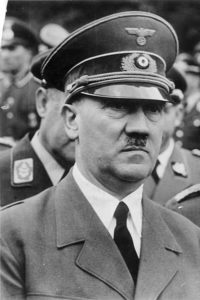 Adolf Hitler, the president of Germany, initiated World War 2 by invading Poland on September 1, 1939. This invasion marked the beginning of the catastrophic global war. After the sudden death of Reichspräsident Paul Von Hindenburg, Adolf Hitler assumed the presidency’s powers and took over the German nation in August 1934. Hitler, who was already the Chancellor, assumed control of the powers under the title of ‘Führer und Reichskanzler’ without any regard to constitutional legality. Adolf Hitler initially served in the Bavarian army in World War 1 as a ‘Gefreiter.’ In 1918, he was gravely injured and hospitalized during the war. Hitler was reportedly furious and devastated when he learned about the Treaty of Versailles and the terms on which the war ended.
Adolf Hitler, the president of Germany, initiated World War 2 by invading Poland on September 1, 1939. This invasion marked the beginning of the catastrophic global war. After the sudden death of Reichspräsident Paul Von Hindenburg, Adolf Hitler assumed the presidency’s powers and took over the German nation in August 1934. Hitler, who was already the Chancellor, assumed control of the powers under the title of ‘Führer und Reichskanzler’ without any regard to constitutional legality. Adolf Hitler initially served in the Bavarian army in World War 1 as a ‘Gefreiter.’ In 1918, he was gravely injured and hospitalized during the war. Hitler was reportedly furious and devastated when he learned about the Treaty of Versailles and the terms on which the war ended.
In 1921, Hitler was appointed the leader of the Nazi Party, replacing the former chairman, Anton Drexler. By this time, Hitler was consistently showing opposition towards the Treaty of Versailles. Following this leadership, he was designated as Chancellor of Germany in 1933 by Hindenburg upon the recommendation of some influential politicians. Soon after the designation, the parliament passed the Enabling Act of 1933, which granted the Chancellor the power to form and enforce laws. This was a major advantage to Hitler, who started taking relevant steps towards transforming the German Republic to Nazi Germany. After he took over as the head of the state in 1934, Hitler held the dictatorship for nearly 11 years. During the second world war, he was a significant figure and was heavily involved in military operations. Hitler chiefly initiated World War 2 by attacking Poland. Britain and France declared war on Germany after this invasion. In 1940, Germany invaded Denmark and Norway, and based on his overconfidence following these victories, Hitler started making some turbulent decisions. He started interfering in military decisions , breaching the Molotov–Ribbentrop Pact and attacking the Soviet Union, which led to disastrous results. He even appointed himself as the armed force’s commander-in-chief after this failed operation and continued to take risky offensive decisions. The downfall of the German Republic’s military position was inevitable under Hitler’s over-ambitious leadership.
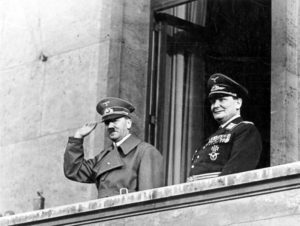
Hitler and Goring
Between 1941 and 1945, Hitler’s enduring operation to bring about Jewish elimination from the nation was in progress. The Holocaust was the genocide of European Jews during the course of the World War. Somewhere around six million Jews were murdered in pogroms and mass shootings under the dictatorship of Adolf Hitler and domination of the Nazi Party. Around the end of 1944, Hitler made a last attempt to gain control through a counter-offensive attack directed towards the American and British troops. This attempt was unsuccessful, and his efforts to negotiate peace with the US and Britain also went in vain. After the complete invasion of Berlin by the Soviet troops, Adolf Hitler and his wife Eva Braun committed suicide in the Reich Chancellery on April 30, 1945. Only two days later, on May 2, Berlin surrendered, followed by the German Republic surrendering on May 7. This was the official end of the second world war in Europe, a war that Adolf Hitler had initiated.
The President of the United States during World War 2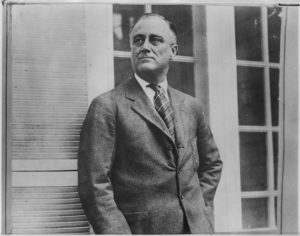 Franklin D. Roosevelt was the president of the US throughout the second world war up to nearly its end. He directed and led the country to war starting from December 8, 1941, after Japan attacked Pearl Harbor, Hawaii, causing significant damage. Roosevelt was the only president elected to office four times, beginning from March 4, 1933, until his death on April 12, 1945. He governed the country through two of the most critical events in history, the Great Depression and World War 2. Focusing on developing domestic policies during the start of his term, since he was elected amidst the Great Depression, Roosevelt inaugurated the New Deal. In 1939, when the war broke out, Roosevelt wanted to pursue the assistance of British and French military power. In a session called by Roosevelt to revoke the Neutrality Act, the isolationist leaders of Congress succeeded in repealing the primary motive of the session. However, he gained Congressional approval for the sale of arms on a cash-and-carry basis.
Franklin D. Roosevelt was the president of the US throughout the second world war up to nearly its end. He directed and led the country to war starting from December 8, 1941, after Japan attacked Pearl Harbor, Hawaii, causing significant damage. Roosevelt was the only president elected to office four times, beginning from March 4, 1933, until his death on April 12, 1945. He governed the country through two of the most critical events in history, the Great Depression and World War 2. Focusing on developing domestic policies during the start of his term, since he was elected amidst the Great Depression, Roosevelt inaugurated the New Deal. In 1939, when the war broke out, Roosevelt wanted to pursue the assistance of British and French military power. In a session called by Roosevelt to revoke the Neutrality Act, the isolationist leaders of Congress succeeded in repealing the primary motive of the session. However, he gained Congressional approval for the sale of arms on a cash-and-carry basis.
Roosevelt stayed firm to his decision of not rushing the nation to war, considering the high casualties the US suffered during World War 2. However, he did declare a state of national emergency and started maximizing and strengthening the US military power after the war had begun among other nations. After the surprise attack on Pearl Harbor, Roosevelt mentioned in his speech that the day of the attack was ’a date which will live in infamy’, and the US declared war on Japan. Following the entrance of the States in the war, Germany and France also declared war on the nation, to which the United States responded reciprocally. Roosevelt established a grand alliance with the nations forming the Allies from the start of the United States’ direct involvement in the war. He maintained cordial relations with the prime minister of Britain, Winston Churchill, and they even pursued the project of preliminary stage research of nuclear weapons jointly. With active wartime discussions and conferences between Roosevelt and the leaders of the United Kingdom, Soviet Union, and China, they formed a strong alliance with the prime focus of bringing Nazi Germany and other Axis Powers down. After Italy surrendered to the Allies, the German forces conceded defeat on May 8, 1945. This was followed by Japan surrendering officially on September 2, 1945, marking the end of WW2.
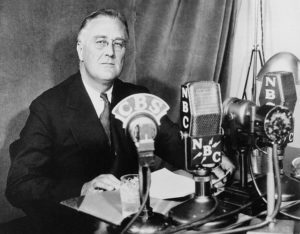
Roosevelt played a significant role in leading the nation during this destructive conflict. It would be fair to say that he eased the path of the ongoing war for his successor, Harry S. Truman. Franklin D Roosevelt, who was in a state of deteriorating health for some time already, died of a massive brain hemorrhage on April 12, 1945. The then vice-president Harry S. Truman took over the office. He directed the United States during the second world war for only a couple of months until the Axis Powers fully surrendered and the six-year-long war came to an end. The Hiroshima bombing was one of the significant attacks during World War 2 initiated by Truman after he took over as the president. Truman was re-elected after he won the 1948 presidential election. He governed the nation through the Cold War period as well. His term ended in 1953, after which he did consider running for the presidential election again but was defeated, considering his declining health and abilities.
In conclusion …
World War 2 was conjointly a conflict that arose due to the plotting and decision of many relevant figures of various nations. Adolf Hitler of Germany, Benito Mussolini of Italy, and Hirohito of Japan were the chief leaders of the Axis Powers. Similarly, Franklin D. Roosevelt of the US, Winston Churchill of Great Britain, and Joseph Stalin of the Soviet Union were the prime alliance of the Allies. Adolf Hitler’s long-planned vision led to the start of one of the most catastrophic events in history. This led to several post-war effects, which were rarely positive. In addition to the numerous casualties, the war brought turbulence in the nations’ economies, war crimes, and hunger crisis. Some of the leaders who initially led their nations to war faced an unpleasant fate. The major instances of Hitler committing suicide and Mussolini being assassinated before the war ended prove this. The end of World War 2 brought victory to the Allies, with Japan surrendering at the very end among the Axis Powers.
FAQs
What political party was Franklin D. Roosevelt in?
Franklin D. Roosevelt, the 32nd president of the United States, was a member of the Democratic Party prior to 1910 when he was recruited to run for a seat in the New York State Assembly. Roosevelt shared a connection with the Democratic Party, which was influenced by his father’s bonding with the party.
What is Winston Churchill best known for?
Winston Churchill served as the Prime Minister of Great Britain twice, and he led the nation to victory during World War 2. He played a major role in shaping the Allied strategy and guiding the country towards victory from the brink of defeat.
What did Hirohito do in WW2?
Hirohito, the emperor of Japan from 1926 to 1989 , initiated the invasion of China, the bombing of Pearl Harbor, and finally the surrender of Japanese troops to the Allies. He was the nation’s leader throughout World War 2 and sided with the Axis Powers officially on September 27, 1940, after signing the Tripartite Pact.
Who executed the Italian prime minister, Benito Mussolini?
Benito Mussolini and his mistress were captured and shot to death by Italian partisans on April 28, 1945. The fascist leader was caught trying to flee to Switzerland, a neutral country during WW2, after realizing the downfall of the Italian troops in front of the Allied nations.
Thank you to Richard Marrison for this useful overview. Find Richard at his own blog on History at historyten.com
The post Two Presidents of WW2 by Richard Marrison #HistoryTen #WW2 #Presidents first appeared on Deborah Swift.June 28, 2022
Leningrad: The People’s War by Rachel R. Heil #CoffeePotBookClub #WW2
I’m delighted to spotlight this fascinating new WW2 novel by Rachel Heil – Leningrad: The People’s War
(Leningrad, Book 1)
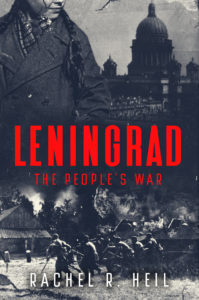
About the Book:
Leningrad, 1941. As Europe crumbles under the German war machine, the people of the Soviet Union watch. There are whispers of war but not loud enough for the civilians of Leningrad to notice. Instead, they keep their heads down and try to avoid the ever-watching eyes of their own oppressive government. University student Tatiana Ivankova tries to look ahead to the future after a family tragedy that characterizes life under the brutal regime. But, when the rumors that have been circulating the country become a terrifying reality, Tatiana realizes that the greatest fear may not be the enemy but what her fellow citizens are prepared to do to each other to survive.
As his men plow through the Russian countryside, Heinrich Nottebohm is told to follow orders and ask no questions, even if such commands go against his own principles. His superiors hold over him a past event that continues to destroy him with every day that passes. But, when given the opportunity to take an act of defiance, Heinrich will jump at the chance, ignoring what the end results could be.
Leningrad: The People’s War tells the harrowing beginning of a war that forever changed the landscape of a city, told through the eyes of both sides in a tale of courage, love, and sacrifice.
Click to buy the book
This novel is also available on #KindleUnlimited.
About Rachel R. Heil
Rachel R. Heil is a historical fiction writer who always dreamed of being an author. After years of dreaming, she finally decided to turn this dream into a reality with her first novel, and series, Behind the Darkened Glass. Rachel is an avid history fan, primarily focused on twentieth century history and particularly World War Two era events. In addition to her love for history, Rachel loves following the British Royal Family and traveling the world, which only opens the door to learning more about a country’s history. Rachel resides in Wisconsin.
Follow Rachel on Twitter: https://twitter.com/HeilRachelR
Facebook: https://www.facebook.com/RachelRHeil
June 21, 2022
Raleigh Tudor Adventurer by Tony Riches #CoffeePotBookClub #Elizabethan #Biographical
Tudor adventurer, courtier, explorer and poet, Sir Walter Raleigh has been called the last true Elizabethan.
He didn’t dance or joust, didn’t come from a noble family, or marry into one.
So how did an impoverished law student become a favourite of the queen, and Captain of the Guard?
The story which began with the best-selling Tudor trilogy follows Walter Raleigh from his first days at the Elizabethan Court to the end of the Tudor dynasty.
REVIEW
I think people underestimate how long it takes to write a book such as this – the enormous amount of research, the sheer graft of putting together a narrative that tells of a historical past in a dramatic way, but sticks to the facts. Tony Riches shows us not only Raleigh, but the whole Elizabethan era in his new book, Raleigh Tudor Adventurer. Raleigh, a rather disgruntled law student has to call upon his brother, a much higher-up courtier to get him on the ladder to success. The two brothers have not much love for each other and this is clearly drawn. We follow Raleigh through his exploits on board his ship Falcon, into his cramped cabin with space enough for books. For Raleigh is also a poet, and we see him earlier in the novel in the company of Burbage at the new theatre. Raleigh comes across as a man who wears many hats – not afraid of battle or bloodshed, or storms at sea, but also able to appreciate literature, and more importantly to move in court circles.
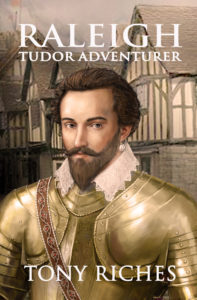 Life on board ship is contrasted with the stultified rituals of court life. Raleigh is famous for his dealings with Elizabeth at court, and in this book we meet many other interesting historical figures such as Francis Walsingham, Bess Throckmorton, Edmund Spenser, Robert Cecil, to name only a few. In fact the cast in this book is enormous and its a credit to Tony Riches that he manages to keep them all individuals with credible personalities.
Life on board ship is contrasted with the stultified rituals of court life. Raleigh is famous for his dealings with Elizabeth at court, and in this book we meet many other interesting historical figures such as Francis Walsingham, Bess Throckmorton, Edmund Spenser, Robert Cecil, to name only a few. In fact the cast in this book is enormous and its a credit to Tony Riches that he manages to keep them all individuals with credible personalities.
Raleigh is a towering figure of his age and Riches has done him justice.
If you love the Elizabethan period, and have a thirst for a novel with a huge scope, you will love this book.
You can buy the book here mybook.to/Raleigh
or read it free with your subscription to Kindle Unlimited.
Tony Riches is a full-time UK author of best-selling historical fiction. He lives in Pembrokeshire, West Wales and is a specialist in the lives of the Tudors. He also runs the popular ‘Stories of the Tudors’ podcast, and posts book reviews, author interviews and guest posts at his blog, The Writing Desk. For more information about Tony’s books please visit his website www.tonyriches.com and find him on Twitter @tonyriches
The post Raleigh Tudor Adventurer by Tony Riches #CoffeePotBookClub #Elizabethan #Biographical first appeared on Deborah Swift.June 18, 2022
De-clutter your description in historical fiction #HistoricalFiction #amwriting
I’ve just been reading a historical novel set back in Tudor times. And I was taken with the fact that often my imagination was held up by unnecessary words. These are words that don’t earn their keep and merely make the prose more verbose. Often these are words about the materials used in the past to make something. Of course they make the book sound ‘historical’ but do they really add anything?
Here are the main culprits. These are not quotations from the book I was reading, but examples, to show you what I mean.
No 1. ‘Wooden’.
‘In the Golden Hind tavern he pulled out a wooden chair and sat down, pulling his earthenware cup towards him.’
So, chairs are usually wooden. If it was made of metal, or upholstered in velvet, or painted bright red, then it might be worth noting. Otherwise, its just unnecessary clutter. Do we need ‘earthenware’ for the cup? Well, I suppose it could be horn, or pewter or gold so perhaps that is a more necessary word. But still, unless it directly impacts the scene, its probably unconscious padding by the author to make it seem ‘historical’.
Want some specific chairs for your book? More about chairs https://antiques.lovetoknow.com/Antique_Chair_Styles
No 2. ‘Iron’
‘He grabbed the iron doorknocker and rapped.’ ‘The door creaked on its iron hinges.’ ‘In the Fleet prison, he grabbed the iron bars in both hands and wondered how it had come to this.’
Doorknockers and hinges and prison bars are usually iron. Telling the reader what they are made of makes it appear as if the writer is trying too hard to spell everything out. The adjective interferes with the directness of the action, and holds us up whilst we try to imagine something that, in fact, we are already imagining.
Want a specific knocker for your book? Photos of iron door knockers that might inspire you https://www.oliverelliott.org/article/miscellaneous/knockers_pics/
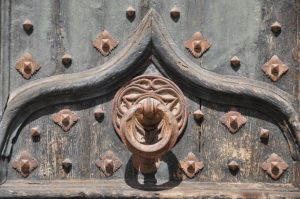
Girona. Cathedral church of Saint Mary. Portal of the apostles. Wooden door with its door knocker and iron decorative nails.1739
No 3. ‘Linen’
‘She tied a linen apron around her waist and began to scrub.’ ‘Her linen petticoats flapped around her ankles as she ran.’
Linen is just too easy. It’s a word designed to simply denote ‘history’. It is probably unnecessary. But much better choices could be made if its important for the reader to know what the apron or petticoats are made of. If poor, an apron could be sacking or hemp, or calico. if rich, petticoats could be starched or sateen or lace-edged. But again, does the description interfere with the action?
Want some language around linen? The Story of Linen – Retting and Rippling https://englishhistoryauthors.blogspot.com/2014/04/retting-and-rippling-story-of-linen.html
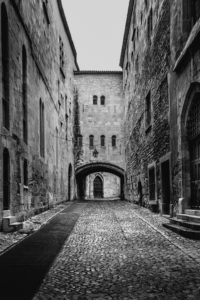
Photo by James Kemp on Unsplash
No 4 ‘Cobbled’
‘He pursued him down the cobbled alleyway towards the docks.’ Every novel I read that is set in the past seems to have these generic cobbled streets — from Tudor times right up until the end of the Victorian era — so adding the word ‘cobbled’ adds little to the reader’s understanding of the particular past that they are inhabiting. Readers expect streets in the past to be cobbled. In fact in later eras most of what people call cobbled roads were paved with granite ‘setts’.
I’m not suggesting you should use ‘setts’ as it’s an unfamiliar word to most people, and would cause the reader to stop and ponder instead of getting on with the story. Usually, the road surface is irrelevant unless the person is going to skid on it, trip over it, or hear the rumble of wheels on it as the cart goes by.
Here is an interesting article on those cobbles. http://graceelliot-author.blogspot.com/2015/05/the-cobbled-streets-of-victorian-london.html
Which brings me to ‘cart’ — another of those generic words! Bonus points for suggesting alternative more particular words.
When editing, I try to weed out as many of these what I call ‘historicisms’ as possible, and either cut them or replace with something more specific and relevant. The great enemy of any historical novel is vague generality. As a reader I want to be transported to somewhere vivid and memorable.
The post De-clutter your description in historical fiction #HistoricalFiction #amwriting first appeared on Deborah Swift.
May 10, 2022
Extract from The Admiral’s Wife by MK Tod #CoffeePotBookClub #HistoricalFiction
The Admiral’s Wife
The lives of two women living in Hong Kong more than a century apart are unexpectedly linked by forbidden love and financial scandal.
In 2016, Patricia Findlay leaves a high-powered career to move to Hong Kong, where she hopes to rekindle the bonds of family and embrace the city of her ancestors. Instead, she is overwhelmed by feelings of displacement and depression. To make matters worse, her father, CEO of the family bank, insists that Patricia’s duty is to produce an heir, even though she has suffered three miscarriages.
In 1912, when Isabel Taylor moves to Hong Kong with her husband, Henry, and their young daughter, she struggles to find her place in such a different world and to meet the demands of being the admiral’s wife. At a reception hosted by the governor of Hong Kong, she meets Li Tao-Kai, an influential member of the Chinese community and a man she met a decade earlier when he was a student at Cambridge.
As the story unfolds, each woman must consider where her loyalties lie and what she is prepared to risk for love
“Family secrets and personal ambitions, east and west, collide in this compelling, deeply moving novel.” — Weina Dai Randel, award-winning author of THE LAST ROSE OF SHANGHAI
The Admiral’s Wife – EXTRACT
At 6:00 p.m., Kennedy Road was still crowded along the winding section that cut across Victoria Peak. Hong Kong’s ubiquitous red taxis dodged from lane to lane as they ferried commuters from offices in Sheung Wan, Central, and Wan Chai to apartment buildings that crammed the hillside like an invading army. Patricia stared out the tinted windows of their limousine, idly reading the names mounted on each grand entrance gate: Camelot Heights, Wing Wai Court, Amber Garden, Bamboo Grove.
“You seem moody,” Andrew said.
“Do I?” She turned to look at him. “I’m sorry. I guess I’m still annoyed with my father.”
“Come on, sweetheart. That was more than a week ago. Just ignore him and find a job on your own.” He squeezed her hand. “What’s happened to my strong, capable wife? The woman who could handle tough negotiations with people who had twice as much experience.”
Patricia flashed him a little smile. “You’re right,” she said. “But the whole thing still pisses me off.”
Her husband rubbed the red stubble on his face, a sign that he was weighing his next words. “Should we return to New York?” he asked.
She pushed a strand of long black hair behind one ear. “No, no, no. We can’t go back to the U.S. My father would have a fit. So would my mother. But I’m going nuts with nothing to do.”
During the first three or four months in Hong Kong, Patricia had spent her days organizing their spacious apartment, exploring the city, spending time with her family, and indulging in what she thought of as frivolous pursuits like shopping and weekly pedicures. She had also played tennis, learned mahjong, taken up qigong, and made a few friends. After almost twenty years of working in a demanding career, she’d considered this interlude a well-deserved rest.
Depression had come on unexpectedly. The first sign was difficulty getting out of bed in the morning. General fatigue and irritability had followed, and there were days when she just couldn’t focus. Andrew had encouraged her to go to the doctor. Doctor Leung, her mother’s GP, had prescribed pills but after less than a month Patricia had stopped taking the medication. At the same time, she’d resolved to get back to work.
“I know it’s been difficult,” Andrew said. He took her hand again and ran his thumb across her fingers. “You’ll find something. But please don’t antagonize your father tonight. I’m finally making headway at the bank. I think he’s even beginning to appreciate my skills, which is an improvement over resenting me. If he believes he can trust me, there could be more opportunity here than back home. And more money. I have to think of the kids.”
“I wish we could see them,” she said. Sadness surged across her chest.
“So do I. Very much. But they’ll be here for Christmas.”
Andrew’s ex-wife had primary custody of his two children. When Patricia and Andrew lived in New York, Steven and Emma had spent every other weekend with them, but now that they were in Hong Kong, visits could only be scheduled during summer holidays, spring break, and Christmas, unless business took Andrew to the U.S. After agonizing over the decision, she and Andrew had agreed to restrict their relocation to three years. They both missed his children terribly, a sacrifice made more acute by her inability to carry a baby to term.
Patricia looked at her husband, whose pale blue eyes were bloodshot from a string of late nights. She was being unreasonable but couldn’t help herself. Situations that she would have dismissed as trivial when they lived in New York had become major sources of discontent and angst.
“If I had a job . . .” Her voice trailed off. They’d been round and round the topic all week. Andrew was becoming exasperated.
“Well, given your father’s reaction, you should probably wait a while before raising that topic again.” Andrew withdrew his hand and fingered the crease of his dark gray pants. “What about looking outside banking? You’re a great project manager.”
“Maybe,” Patricia said. “But so far, every possibility I’ve found requires Asian experience and fluency in Cantonese or Mandarin.” She sighed. “Dammit. Why does he always make things so difficult?”
“To tell you the truth, I have no idea. Probably because he can. I admire many of your father’s tactics. But I don’t like the way he treats people, especially you.” Andrew’s voice was gentler than before. “Aren’t you seeing someone about that board position?”
“Mm-hmm. Arthur Chung said it’s mine if I want it.” She linked her fingers with Andrew’s. “We’re meeting Friday afternoon for a briefing on the role he wants me to play. I’m sure he only asked me to get a donation from Ah Ba, but it could be interesting.”
Their driver merged the Mercedes onto Queen’s Road East, past hotels and schools along with a Sikh temple and remnants of air-raid tunnels built during the Second World War. Traffic was at a standstill.
“Well, make the best of it for now,” he said. “I’m sure things will get better.”
Patricia knew her husband was trying to be helpful, but his remark felt patronizing. She hated being patronized. Unlike many of her male colleagues who had underestimated her abilities, Andrew had treated her as an equal from the day they’d met. Had their new circumstances changed his perspective? Was she only his equal when they were both working?
After she’d told him about the conversation with her father, Andrew had asked why she’d allowed her parents to persuade her to live in a place that had never been her home. Patricia hadn’t replied. And ever since, the question had hovered, unsettling in its stark clarity.
She loved her parents, despite their idiosyncrasies and traditional ways. And they loved her. Of that she was certain. Eighteen months earlier, when she and Andrew still lived in New York, her mother had ended a lengthy argument about Patricia’s duty to her family by saying, “We’ll be dead soon and then you’ll be sorry you never came back.”
That conversation had been the tipping point. After much debate, Andrew had agreed to try living in Hong Kong. They’d also agreed that if it didn’t work out, they would return to New York. Ever since, she’d felt displaced, torn between Andrew’s world and the Chinese world of her parents. Her husband expected a modern businesswoman with Western values; her parents expected a dutiful Chinese daughter. The two were irreconcilable.
“I wonder when this place is going to feel like home,” Patricia said.
“You’re the one—”
“Yes, I know,” she said. “I’m the one who wanted to move here. I’m just a little out of sorts. But don’t worry. I’ll make nice with my father. You should know, though, that I’m not going to put up with him telling me what to do any longer.”
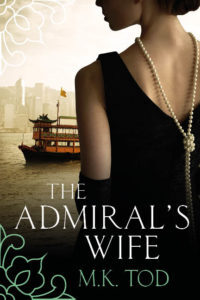 WANT MORE? BUY THE BOOK
WANT MORE? BUY THE BOOK
Connect with Mary:
Website: https://www.mktod.com
Blog: https://www.awriterofhistory.com
Twitter: https://twitter.com/MKTodAuthor
Facebook: https://www.facebook.com/mary.tod.3/
The post Extract from The Admiral’s Wife by MK Tod #CoffeePotBookClub #HistoricalFiction first appeared on Deborah Swift.Review – Letting in the Light by Charlotte Betts #GreatWar #Cornwall @PiatkusBooks
LETTING IN THE LIGHT by Charlotte Betts
1914 Spindrift House, Cornwall
Edith Fairchild’s good-for-nothing husband, Benedict, deserted her when their children were babies. Now the children are almost adult, Edith and Pascal, her faithful lover of two decades, are planning to leave their beloved Spindrift artists’ community and finally be together.
But an explosive encounter between Benedict and Pascal forces old secrets into the light, causing rifts in the happiness and security of the community. Then an assassin’s bullet fired in faraway Sarajevo sets in motion a chain of events that changes everything.
Under the shadow of war, the community struggles to eke out a living. The younger generation enlist or volunteer to support the war effort, facing dangers that seemed unimaginable in the golden summer of 1914.
When it’s all over, will the Spindrift community survive an unexpected threat? And will Edith and Pascal ever be able to fulfil their dream?
REVIEW
I’d been waiting for a few quiet relaxing moments to finish off this trilogy, knowing how much I’d enjoyed the first two parts.
This is the third book in the Spindrift Trilogy set in an artists colony in Cornwall. In this book we see the culmination of all the plot threads that went on in the previous two books, and also how the younger generation are influenced by the mistakes and successes of their parents. We are hooked from the get go, by the fact someone wants to turn the house we all know and love into a hotel, and the action from then on never stops.
Charlotte Betts has an enormous cast of characters to deal with, but such is the quality of the writing that you are always sure who is who, and what their relationship is to the others in the story. The great mix of characters is one of the joys of this novel, from the scheming Gabrielle, and the hateful Benedict, to Edith who is doing her best to hold everything together against the encroaching tide of war and its inevitable changes. There are old family feuds, unrevealed secrets to discover, and of course a love that sustains Edith and Pascal over all the generations. This is a great entertaining novel and I highly recommend it. To get the most from the series though, I suggest you read them all.
PS You’ll probably need tissues for the end.
You can read more about the series here on Charlotte’s website
Follow Charlotte on Twitter @CharlotteBetts1
The post Review – Letting in the Light by Charlotte Betts #GreatWar #Cornwall @PiatkusBooks first appeared on Deborah Swift.May 1, 2022
Extract and Review: The Missionary by Rowena Kinread #Roman #Pagan #Irish #CoffeePotBookClub
Read this atmospheric extract from The Missionary by Rowena Kinread
They trudged on at a steady pace for several hours. Patricius’ initial optimism died rapidly. He had blisters on his toes and heels. The iron shackles had scoured the skin around his ankles, and they were so sore that every step was torture. The goats were no longer patiently obedient but kept stubbornly stopping and trying to munch grass or chomp leaves. Each time they did so, the underking bellowed and let his whip crack. Sometimes the tip nicked Patricius’ back painfully. The track had become narrow in many places where brambles had engulfed the passage, and Patricius’ arms and legs were covered in bloody scratches. They hadn’t passed a single house, farm, village or town. Nor had they seen a single person. When the midges started descending and dusk approached, the light was so poor that Patricius stumbled again and again over tree roots on the ground, scrubbing his knees and nearly losing the goats. The mosquitos began to attack his body, sticky with sweat, and although he tried to wipe them away with his free hand, they feasted upon him, causing swollen red bumps that itched irritably.
The moon had already started to rise in the sky as they emerged from the forest. They entered a glen with rolling hills, and at its base, a small lough. Here they stopped and pitched camp. Orders were shouted back and forth.
The livestock were led to the lakeside to drink and then tethered to trees and fed. Wood was collected and a fire lit. A huge iron pot was suspended on three poles over the fire. The servants boiled water in it and added chunks of meat and vegetables.
Patricius and Domi pointed to their shackles and, motioning with their hands, begged a servant for them to be removed. The servant pointed to the underking, said “Miliucc,” and shook his head.
In the meantime, the underking, Miliucc, had made himself comfortable. He sat on sheepskins, leant his back against a wheel of the wooden cart, and was drinking beer and stroking his dog. He was still wearing his fox stole. When the food was ready, it was brought to him with a loaf of bread. He ate noisily, dipping bread into the stew and slurping. Patricius’ stomach rumbled. He had had nothing to eat all day. Miliucc took his time. When he was eventually satisfied, he fished chunks of meat out of the soup with his grubby fingers and fed them to his dog. She gobbled them up greedily, licking his fingers, whilst Domi, Patricius and the servants watched. Not until she had finished did Miliucc gesture to the servants to take the pot away. The servants fell over the food hungrily, not letting the slaves anywhere near it. Only when they too were finished, were Patricius and Domi allowed to mop up the dregs with a bread crust. Then together, still hungry, Patricius and Domi limped to the lake, washed themselves and cleansed their wounds.
Back at the camp, Patricius used his teeth to rip strips of fabric from his tunic and bandage his ankles, hands and feet. His head was still aching from the blow he had received, and his teeth started to chatter. He edged as near to the fire as he dared, curled up and listened to the leaves rustling in the breeze. Far in the distance, he heard wolves howling, and a grey heron screeched as it flew away from the edge of the lough. He had never felt so afraid and lonely in his entire life.
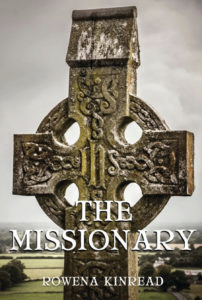 My Review of The Missionary
My Review of The Missionary
This novel fictionalizes the life of St Patrick. It begins in 406 AD when life in Britain is unstable and the formerly Roman lands were subject to invasions by warring tribes. It is a brutal time and one where civilisation meant the keeping of slaves and commonly, the use of women as chattels. In a violent invasion, Patricius is captured and taken as a slave by the Gauls in Hibernia. His horrendous experiences there lead him to want to return later in life and bring the Christian faith of goodness and mercy to their land.
The novel is extremely well researched and well written, with excellent descriptions of ancient Ireland and its way of life. It leads you to consider the idea of magic and miracle in religion, and how these things were used to convert people to God (s). Both genuine experience and trickery can be seen at work in this novel, not least when Patricius must defeat the Druids at their own brand of magic.
Patricius himself is deeply flawed, and an explanation for this choice is made at the end of the book. He has his good points too, a deep love for animals, and a willingness to try to atone for this appalling sin that haunts him. The novel covers his whole life and is a great introduction for anyone who knows little about him. Clear notes explain what is fact and what is fiction.
I recommend this book to all who are interested in Roman, Irish or Christian history, and are prepared to set aside their preconceptions about what a Saint should look like. Thoroughly worth reading.
 About Rowena:
About Rowena:
Rowena Kinread grew up in Ripon, Yorkshire. After leaving school she started working for Lufthansa in Stuttgart. There she met her future husband whom she married in Ripon. After raising 3 children, she began working as a secretary in a private physiotherapy practice. At the same time, she started writing non-fiction books and magazine articles. Retirement finally brought the financial security to start writing full length fiction. A keen interest in history and her own family ancestry inspired her debut novel “The Missionary”, the dramatic story about the life of St.Patrick. A second book “The Scots of Dalriada” will be published this year. Rowena says that she welcomed retirement and all its wonderful opportunities to launch a third career.
Website: rowena-kinread.com Twitter: https://twitter.com/RowenaKinread
The post Extract and Review: The Missionary by Rowena Kinread #Roman #Pagan #Irish #CoffeePotBookClub first appeared on Deborah Swift.April 28, 2022
The Lake Pagoda by Ann Bennett – Read an Extract #WW2 #IndoChina #CoffeePotBookClub #Bookouture
 Read this stunning extract from The Lake Pagoda by Ann Bennett
Read this stunning extract from The Lake Pagoda by Ann Bennett
Chapter 1
Paris, November 1946
Arielle pulled her shawl tightly around her shoulders and stepped out of the entrance to the apartment building and onto the broad pavement of Boulevard St Germaine. An icy wind whipped around her, driving up from the River Seine, funnelled by the tall buildings. She shivered and gritted her teeth against the weather. It was so alien to her, this biting cold air that chilled you to the marrow of your bones. In her native Hanoi, the temperature, even in the cooler months, was always comfortable and she was so used to the sultry heat of that city that this Paris winter was a cruel shock.
Even so, she needed to get out. She couldn’t stay inside the stuffy, cramped apartment a moment longer, and while her father was sleeping it was difficult to do anything in that tiny space without disturbing him. So, each morning she left the building to tramp the streets of this alien city, exploring the alleys of the Latin Quarter, the cobbled lanes and churches of the île de la Cité, the boulevards and gardens of the Eighth Arondissement. And as she walked, she watched the stylish Parisians going about their business, dashing to and fro in fashionable clothes, getting out of taxis, riding on trams, pouring down the steps of the metro. She was trying to understand her new home, to find her place in it, to find some meaningful connection with this great, intimidating city. And there was something else she was searching for too.
Now, as she braced herself against the wind and started walking along the boulevard away from the apartment, she glanced guiltily back up at the windows on the third floor. She always worried when she left Papa alone. What if he were to wake up and call out for her? What if he had one of his coughing fits? But he always encouraged her to go. ‘Go on, explore while I’m resting. You need to get to know the place. You can’t stay cooped up with a sick old man all day. I’ll be fine on my own.’ But still she worried.
She carried on down the road, making for the market in Rue Mouffetard. Cars and buses crawled past belting out fumes. Through the lines of slow-moving traffic wove bicycles and pony traps, army jeeps too. It felt so bleak here and so dull after the vibrant colours of Hanoi; the plane trees that lined the pavements had lost their leaves, their branches stark against the tall, pale buildings, and the sky between them was an ominous slate grey.
She walked past a couple of bus stops without pausing. She’d never yet got on a bus in Paris; she had no idea how they worked and was afraid of drawing attention to herself, even though she told herself it was perfectly safe here to do so. Years of having to keep a low profile in Hanoi had made her fearful of attention from anyone. Not that she need worry here in Paris, people barely noticed her. She could walk in the midst of a crowd as if she didn’t exist. And if anyone’s eyes did happen to light on her, seeing her dark skin and black hair they would quickly flick away, for she was half Vietnamese and it was as if she were invisible to them; a nobody.
ABOUT THE BOOK
Indochina 1945: Arielle, who is half-French, half-Vietnamese, is working as a secretary for the French colonial government when the Japanese storm Hanoi. Although her Asian blood spares her from imprisonment, she is forced to work for the occupiers. The Viet Minh threaten to reveal dark secrets from her past if she won’t pass them information from her new masters.
Drawn ever deeper into the rebels’ dangerous world, will Arielle ever escape the torment of her past? Or will she find love amidst the turmoil of war?
A novel of love, loss, war, and survival against all odds.
BUY THE BOOK or read on #KindleUnlimited
 Ann Bennett was born in Pury End, a small village in Northamptonshire, UK and now lives in Surrey. Her first book, A Daughter’s Quest, originally published as Bamboo Heart, was inspired by her father’s experience as a prisoner of war on the Thai-Burma Railway. The Planter’s Wife (originally Bamboo Island) a Daughter’s Promise and The Homecoming, (formerly Bamboo Road), The Tea Panter’s Club and The Amulet are also about the war in South East Asia, all six making up the Echoes of Empire Collection. Ann is also author of The Runaway Sisters ,The Orphan House, and The Child Without a Home, published by Bookouture. Ann is married with three grown up sons and a granddaughter and works as a lawyer. For more details please visit www.bambooheart.co.uk Twitter: https://twitter.com/annbennett71
Ann Bennett was born in Pury End, a small village in Northamptonshire, UK and now lives in Surrey. Her first book, A Daughter’s Quest, originally published as Bamboo Heart, was inspired by her father’s experience as a prisoner of war on the Thai-Burma Railway. The Planter’s Wife (originally Bamboo Island) a Daughter’s Promise and The Homecoming, (formerly Bamboo Road), The Tea Panter’s Club and The Amulet are also about the war in South East Asia, all six making up the Echoes of Empire Collection. Ann is also author of The Runaway Sisters ,The Orphan House, and The Child Without a Home, published by Bookouture. Ann is married with three grown up sons and a granddaughter and works as a lawyer. For more details please visit www.bambooheart.co.uk Twitter: https://twitter.com/annbennett71
The Stone Rose by Carol McGrath #medieval #historicalfiction #Review @AccentPress
This is the third in the splendid She-Wolves Trilogy and I’ve read them all. This one is about Queen Isabella, wife to Edward II. In my opinion this is the best and a fitting finale to an exploration of women and their role at court. From the opening where we are plunged into All Soul’s Night and every knock at the door could be a horror, to the end, when Isabella is alone and only contemplating the ghost of Edward, her husband and King, we are completely immersed in another world.
The novel benefits from the secondary character, Agnes, a real life stone-mason who is commissioned to carve her tomb and is to tell Isabella’s story and make sure we know the truth. Out in the land, England is recovering from the devastation of the Black Death – something that makes these characters’ lives seem even more fragile., Much of court life is political maneuvering and Carol McGrath manages to keep the tensions up by the use of her characters and their personal concerns. For example, at one point Isabella bemoans the fact that her husband was always happiest away from his castle duties and insists on mixing with the peasants, something she thinks beneath him. Isabella is dismayed too by his choice of companions. Those people who, like me, have studied Shakespeare’s Edward II will know of Piers Gaveston, and he features in this book along with another of the King’s favourites, Hugh Despenser.
Isabella comes across as a strong woman beset by the troubles of a husband whose ear is poisoned by his favourites who have their own agendas. This is a fascinating slice of history to which Carol McGrath does ample justice in this gripping novel. Historical notes at the end explain the choices the author made.
History fans will love this well-researched evocation of court life. Highly recommended.
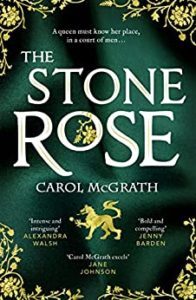
You can BUY the BOOK HERE
Find Carol McGrath on her website www.carolmcgrath.co.uk
Or chat to her on Twitter @carolmcgrath
The post The Stone Rose by Carol McGrath #medieval #historicalfiction #Review @AccentPress first appeared on Deborah Swift.
April 25, 2022
Historical Fiction Spotlight: Beheld by Christopher M Cevasco #AngloSaxons #HistoricalFiction #CoffeePotBookClub
NEW RELEASE! BEHELD ~ Godiva’s Story
by Christopher Cevasco
A darkly twisted psychological thriller exploring the legend of Lady Godiva’s naked ride.
Having survived a grave illness to become one of 11th-century England’s wealthiest landowners, Godgyfu of Coventry (Lady Godiva) remains forever grateful to the town whose patron saint worked such miracles. She vows to rebuild Coventry’s abbey and better the lives of its townsfolk. But the wider kingdom is descending into political turmoil, and her husband, Earl Leofric, starts to break under the strain. Godgyfu finds her own plans unravelling the moment she meets Thomas, a Benedictine novice with perverse secret desires. Three lives become dangerously entangled in a shocking web of ambition, voyeuristic lust, and horrid obsession. Can Godgyfu escape the monk’s menacing wiles and Leofric’s betrayals to secure her future in a changing kingdom? Perhaps, but first she faces a dark test of wills leading her perilously closer to a legendary ride…
Christopher M. Cevasco was born in New Jersey and spent a memorable decade in Brooklyn, New York, but he feels most at home in medieval England, Normandy, Norway, and Greenland. A lifelong passion for history and fiction led him to earn degrees in Medieval Studies and English and later to embark upon a writing career that merges these two loves.
Chris was the founding editor of the award-winning Paradox: The Magazine of Historical and Speculative Fiction from 2003 to 2009. His own short stories appear in Black Static, Beneath Ceaseless Skies, Distant Echoes (Corazon Books, UK), and the Prime Books anthologies Shades of Blue and Gray: Ghosts of the Civil War and Zombies: Shambling Through the Ages.
A long-time member of the Historical Novel Society, Chris currently serves on the society’s North American conference board as registration chair for the upcoming 2023 conference in San Antonio, Texas. Chris lives with his wife and their two children in Myrtle Beach, South Carolina.
Find Chris here:
Website: https://www.christophermcevasco.com
Twitter: https://twitter.com/cevasco_m
Facebook: https://www.facebook.com/christopher.m.cevasco
The post Historical Fiction Spotlight: Beheld by Christopher M Cevasco #AngloSaxons #HistoricalFiction #CoffeePotBookClub first appeared on Deborah Swift.



